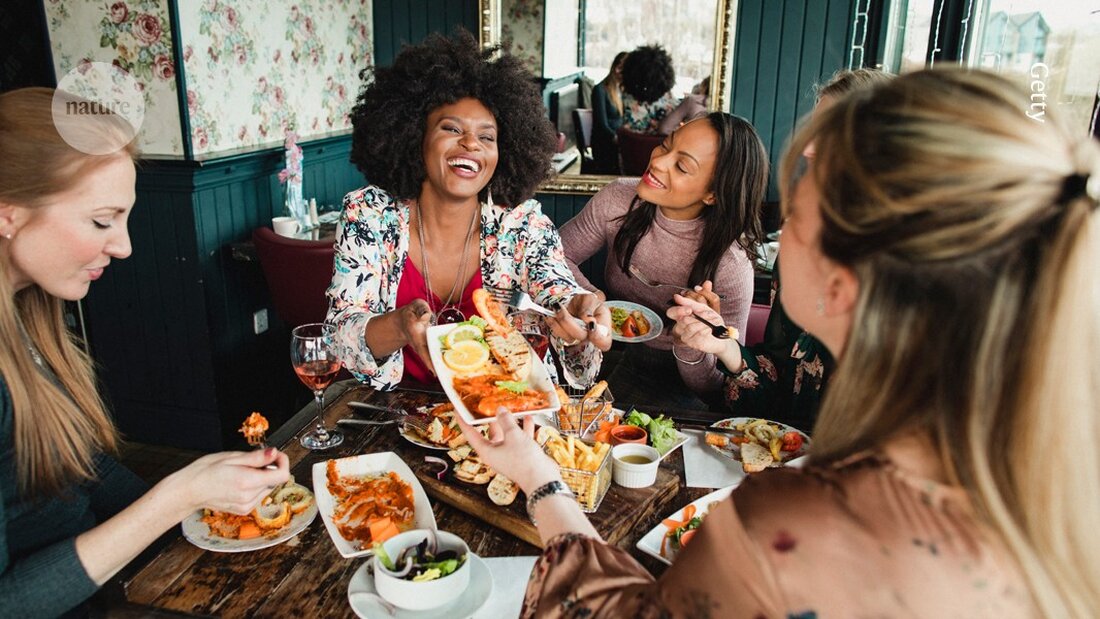Friends influence your microbiome - and so do their friends
Friendships not only influence our well-being, but also our microbiomes. A study shows that social interactions shape the composition of intestinal microbes and can therefore influence health risks.

Friends influence your microbiome - and so do their friends
Eating together, a kiss on the cheek: these social actions bring people together - and also their microbiomes. The more people interact, the more The composition of their intestinal microbes is similar, even if the individuals do not live in the same household, as one study 1 shows.
The study also found that a person's microbiome is not only shaped by their social contacts, but also by the connections of these social contacts. The work is part of several studies 4, which raises the possibility that health conditions may be influenced by the exchange of the microbiome between individuals, not just by Diet and other environmental factors that influence intestinal flora.
In the effort to understand what shapes a person's microbiome, social interactions are "definitely a missing piece of the puzzle that has been overlooked until recently," says microbiologist Catherine Robinson of the University of Oregon in Eugene, who was not involved in the work.
The research was published November 20 in Nature.
Mine is yours
The study has its roots in a study published almost 20 years ago 2, which examined how obesity spreads on social networks. Certain viruses and bacteria that occur in... Gut microbiome occur are known to do this Risk of obesity 3 increase, and social scientist Nicholas Christakis wondered whether friends transmit these microbes to each other, in addition to the influence they have on each other's eating habits. “It was a fundamental idea that I just couldn't let go of,” says Christakis, who teaches at Yale University in New Haven, Connecticut.
Since then there have been several publications 4, 5, 6 suggested that social interactions shape the gut microbiome. Christakis and his colleagues traveled to the jungles of Honduras to contribute to this emerging literature. There, they mapped the social relationships and analyzed the microbiomes of people living in 18 isolated villages where interactions are primarily face-to-face and where people rarely eat processed food Are exposed to antibiotics that can change the composition of the microbiome.
“This was a huge undertaking,” says Christakis, as the team had to work in a remote area and then bring the samples back to the United States for processing.
Spouses and people living in the same house share up to 13.9% of the microbial strains in their guts. The researchers found that people who do not live under the same roof but regularly spend their free time together share 10%. In contrast, people who live in the same village but do not tend to spend time together share only 4%. There is also evidence of chains of transmission: friends of friends share more strains than would be expected by chance.
The findings deepen scientists' understanding of what shapes the microbiome, in part because the team looked at subspecies of gut microbes, says microbiologist Mireia Valles-Colomer of Pompeu Fabra University in Barcelona, Spain, who was not involved in the work. Social contacts might happen to share the same microbial species, but they are much less likely to share the same strains unless they have transmitted them to each other.
Rethink transmission
Research like this “completely changes the way we think” as it suggests risk factors for conditions linked to the microbiome, such as high blood pressure 7 and depression, could spread from person to person via their microbiomes, says computational biologist Nicola Segata of the University of Trento in Italy. Segata was not involved in the current work but has worked with Valles-Colomer and members of Christakis' team on similar research in the past.
In the case of depression, which can be difficult to treat, combining existing therapies with microbial-targeting treatments could help improve care, says Valles-Colomer.
But people shouldn’t avoid social interactions for fear of “capturing” others’ microbiomes. Social interactions can spread components of healthy microbiomes and numerous others have advantages. Valles-Colomer says: "Close contacts are not bad for us. On the contrary - they are beneficial!"
-
Beghini, F. et al. Nature https://doi.org/10.1038/s41586-024-08222-1 (2024).
-
Christakis, N. A. & Fowler, J. H. N. Engl. J. Med. 357, 370–379 (2007).
-
Geng, J., Ni, Q., Sun, W., Li, L. & Feng, X. Biomed. Pharmacother. 147, 112678 (2022).
-
Valles-Colomer, M. et al. Nature 614, 125–135 (2023).
-
Brito, I.L. et al. Nature Microbiol. 4, 964–971 (2019).
-
Wanelik, K. M., Raulo, A., Troitsky, T., Husby, A. & Knowles, S. C. L. Anim. Microbiome 5, 29 (2023).
-
O'Donnell, J. A., Zheng, T., Meric, G. & Marques, F. Z. Nature Rev. Nephrol. 19, 153–167 (2023).

 Suche
Suche
 Mein Konto
Mein Konto
